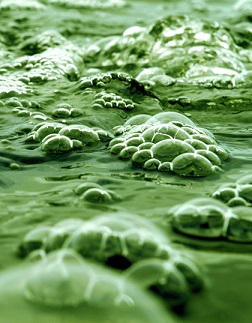Algae 'meats' coming
 Marine microalgae are being used to sustainably produce plant-based ‘meat’.
Marine microalgae are being used to sustainably produce plant-based ‘meat’.
Marine microalgae, single-cell photosynthetic organisms from the ocean, could be the solution to the world’s meat protein shortage, says Flinders University Professor Wei Zhang.
“Microalgae come in a diverse range of nutritional profiles and advanced cultivation strategies can be developed for tuning microalgae to produce protein-, oil- and carbohydrate-dominant types that can be processed into a broad range of functional foods, including healthy cell patties, chips, pastes, jams and even caviar,” Prof Zhang says.
Two freshwater microalgal products currently on the market are the high protein Chlorella and Spirulina varieties used in the production of foods such as green pasta, drinks and beverages.
Marine species are of significant interest as they do not require scarce freshwater and crop land. Their unique nutritional profiles such as their high DHA and EPA content (long chain omega 3 fatty acids) are essential for infant and brain development and cardiac health.
Bioreactors for upscaling upscaled aquatic production of photosynthetic microalgae can also help to combat greenhouse gas emissions and climate change. One 90 x 90 x 210 cm (3 x 3 x 7 ft) bioreactor unit can absorb up to 400 times more carbon dioxide than the same footprint of trees.
Using sunlight, certain varieties of microalgae create oxygen and convert carbon dioxide into organic carbon (protein, carbohydrates, pigments, fats and fibres), just like plants, but do not require valuable arable land for their production.
“They are therefore often called the rainforests of the oceans,” says Associate Professor Kirsten Heimann, senior lecturer in biotechnology at Flinders University.
“Using sunlight, photosynthetic microalgae create oxygen and convert carbon dioxide into organic carbon (protein, carbohydrates, pigments, fats, fibres, and micronutrients), just like plants, but do not require valuable arable land for their production.
“This means microalgae can be sustainably harvested and converted into eco-friendly superfoods,” she says.
“Putting one and one together, microalgae and innovative production and processing could help to service the world’s booming population and growing demand for sustainable protein production,” she says.
Along with research into processing techniques, the same research team is investigating the use of waste or harvested seaweed for biodegradable plastics production, another sustainable solution to non-degradable petroleum-based plastics.








 Print
Print